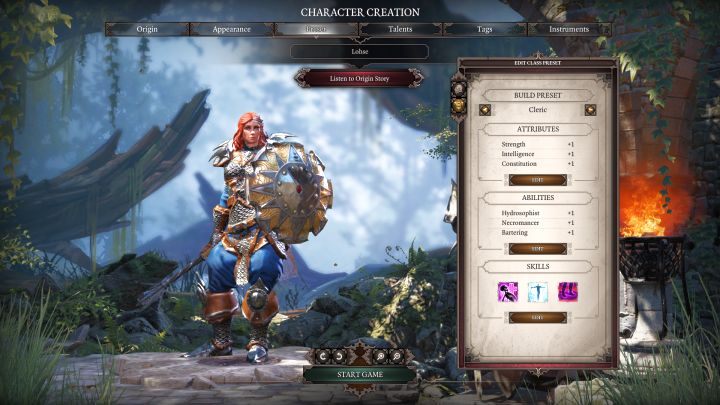Cleric Class in Divinity Original Sin 2
This page of the Divinity Original Sin 2 guide contains a detailed description of Cleric. You'll get acquainted with the basic information on this class, recommended playstyle, as well as its biggest advantages and potential disadvantages.
Cleric is a class that balances offensive abilities with skills that have positive impact on the condition of the whole team. He can be developed as a melee fighter or as a support character. In both cases his starting abilities will allow you to gain advantage over the opponents - especially since the recharge times aren't long.

Below you can find the starting parameters for this class.
Attributes
In case of the Cleric two attributes were strengthened by default.
Attribute name | Values | Notes |
Constitution | +1 | Additional health points are always useful. |
Strenght | +1 | A Cleric is not afraid of close-in combat and, since they can use melee weapons, an additional point in that attribute will be certainly useful. |
Intelligence | +1 | Despite the distribution of points between strength and intelligence, most of them are for spells which are used by representatives of this class. |
Abilities and Talent
In the case of the Cleric, three abilities were improved:
Name | Value | Notes |
Hydrosophist | 1 | Cleric is by definition a supporting class, so healing skills are totally recommended. |
Necromancer | 1 | Automatic healing by draining life from enemies is a great solution on the battlefield. |
Bartering | 1 | Each point of this ability reduces the Cost purchase of items by 10% and increases the price for which you can sell your own items. It is worth to use this character (equipped with objects / abilities increasing Bartering even more) during trade. |
Talent
Hothead - When the character has maximum number of health points, it has greater chance to deal critical damage and it has 10% bonus to attack effectiveness.
Starting abilities
Icon | Name | Notes |
 | Restoration | Since Clerics are support, it's imperative they are able to heal the team. Additionally, the skill cancels all status effects. |
 | Blood Sucker | The possibility of healing with the use of blood puddles, which arose after receiving damage, will certainly be useful. The initial values are not meaningful, but the short cooldown makes the ability worthy of attention. |
 | Decaying Touch | A curse that causes healing effects to damage the target. In case the opposing team has a solid arsenal of spells or healing concoctions. |
Cleric and races
Race | Predispositions | Commentary |
Elf | None | Sadly, in this case most of the parameters work against this race. It doesn't mean it's completely out of question, but it won't give you proper results. |
Human | Moderate | Human can take this class due to high initiative and passive bonus to Leadership. It is a decent choice, but all depends on further development of the character. |
Dwarf | High | Due to the natural strength level and his race ability, the Dwarf fits well the character requirements. In this case the balance is turned towards the conventional weapon, but a balanced development is possible as well. |
Lizard | High | The lizards fit well into each role that is based on character intelligence. In this case, in difference to the dwarves, the balance is turned towards the spells with a profit for the team. |
Which abilities are worth choosing?
A Cleric has access to two schools (Hydrosophist and Necromancer) which means that they can choose from 8 starting abilities. All default abilities of this class are very useful - they allow Clerics to fight in close-in combat, heal their own wounds and support allies. Because of that you shouldn't change anything and use Decaying Touch, Restoration and Blood Sucker.
You are not permitted to copy any image, text or info from this page. This site is not associated with and/or endorsed by the Larian Studios or Larian Studios. All logos and images are copyrighted by their respective owners.
Copyright © 2000 - 2025 Webedia Polska SA for gamepressure.com, unofficial game guides, walkthroughs, secrets, game tips, maps & strategies for top games.
